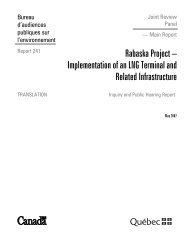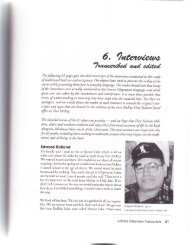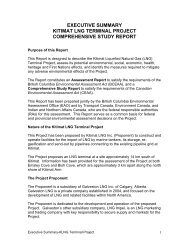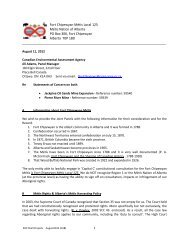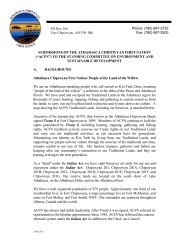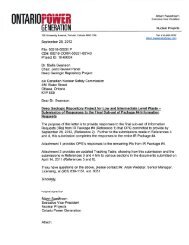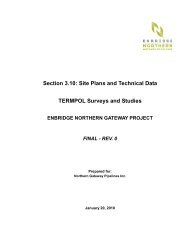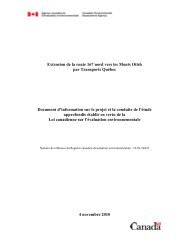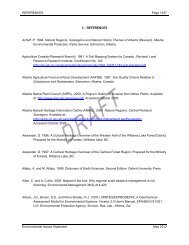Kearl Oil Sands Project
Kearl Oil Sands Project
Kearl Oil Sands Project
Create successful ePaper yourself
Turn your PDF publications into a flip-book with our unique Google optimized e-Paper software.
(c) Capacity to decide<br />
48 I turn to consider the Commission's capacity to decide. As I understand Alcan's submission,<br />
the issues surrounding the consultation duty are so remote from the Commission's usual terms of<br />
reference that the Commission should not be expected to decide them. Alcan argues that the<br />
appellant should go to court for redress. I quote from paras. 88 and 89 of Alcan's factum:<br />
88. ... to accept the CSTC's invitation [to entertain the consultation issue] would mire<br />
the Commission in complex questions of fact and law to which its mandate,<br />
statutory powers and remedies are ill-suited.<br />
89. In the end, the argument comes full circle: the CSTC are seeking redress for their<br />
grievances in the wrong forum.<br />
49 Paul rejected the argument that Aboriginal law issues may be too complex and burdensome<br />
for an administrative tribunal, at para. 36:<br />
To the extent that aboriginal rights are unwritten, communal or subject to<br />
extinguishment, and thus a factual inquiry is required, it is worth noting that<br />
administrative tribunals, like courts, have fact-finding functions. Boards are not<br />
necessarily in an inferior position to undertake such tasks. Indeed, the more<br />
relaxed evidentiary rules of administrative tribunals may in fact be more<br />
conducive than a superior court to the airing of an aboriginal rights claim.<br />
50 I heard nothing in the appeal which causes me to doubt the capacity of the Commission to<br />
hear and decide the consultation issue. Expressed in more positive terms, I am confident that the<br />
Commission has the skill, expertise and resources to carry out the task.<br />
2. The Duty to Decide<br />
51 Not only has the Commission the ability to decide the consultation issue, it is the only<br />
appropriate forum to decide the issue in a timely way. Furthermore, the honour of the Crown<br />
obliges it to do so. As a body to which powers have been delegated by the Crown, it must not deny<br />
the appellant timely access to a decision-maker with authority over the subject matter.<br />
52 The process of consultation envisaged in Haida requires discussion at an early stage of a<br />
government plan that may impact Aboriginal interests, before matters crystallize, so that First<br />
Nations do not have to deal with a plan that has become an accomplished fact. Haida said this on<br />
the question of timing, at para. 35:<br />
Page 22<br />
But, when precisely does a duty to consult arise? The foundation of the<br />
duty in the Crown's honour and the goal of reconciliation suggest that the duty<br />
arises when the Crown has knowledge, real or constructive, of the potential<br />
existence of the Aboriginal right or title and contemplates conduct that might




